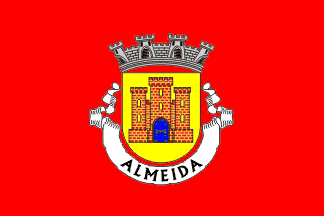Almeida Municipality (Portugal) (original) (raw)

This page is part of © FOTW Flags Of The World website
Last modified: 2015-07-19 by klaus-michael schneider
Keywords: almeida | castle(red) |
Links: FOTW homepage |search | disclaimer and copyright | write us | mirrors

image by Sérgio Horta, 28 Jan 2009
- About the flag
- Coat of arms
- Version without the coat of arms
- Presentation of Almeida See also:
- Almeida Communes
- Portugal External links:
- Page about the municipal flag and coat of arms of Almeida at Sérgio Horta’s website (in Portuguese).
reported by Jorge Candeias, 29 Feb 1999 - Page about Almeida at the Portuguese Municipalities’s Association website (incl. image of the arms)
reported by António Martins, 18 Nov 2001
About the flag
According to my sources, the flag has a plain reddish purple field with the coat of arms in the centre. However, I believe that the official descriptions of the flags do not include this colour, so, officially, it may be either red or purple. The coat of arms has a four-toweredmural crown, a greenish yellow shield charged with a red castle with a blue door, and a scroll with a single word: "ALMEIDA".
Jorge Candeias, 31 May 1998
Coat of arms

image by Sérgio Horta, 28 Jan 2009
There is not much guessing to do with this coat of arms. Almeida is an unusual place, because it’s a town completely surrounded by beautiful defensive walls in the shape of a 10-pointed star, so the castle is a reference to that.
Jorge Candeias, 31 May 1998
Version without the coat of arms
Plain (monocolored) portuguese subnational flags are not allowed to have armless variations: plain flags always carry the coat of arms.
Jorge Candeias, 18 Jul 1999
Presentation of Almeida
Almeida is a town that belongs to the district of Guarda, old province of Beira Alta, future region of Beira Interior, near the border with Spain. Its municipality has 520,6 km2 and about 9500 inhabitants living in 29 communes. It’s economy is mostly rural. I believe that this is one of the municipalities claimed by the leonese irredentists.
Jorge Candeias, 31 May 1998
back to Municipalities of Portugal click here